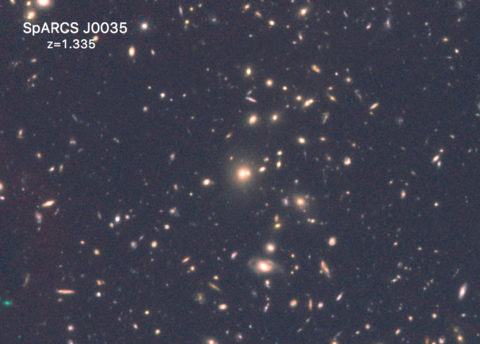Keck Observatory | University of California, Riverside | 2018 Oct 23
Galaxy clusters are rare regions of the universe consisting of hundreds of galaxies containing trillions of stars, as well as hot gas and dark matter.
It has long been known that when a galaxy falls into a cluster, star formation is fairly rapidly shut off in a process known as “quenching.” What actually causes the stars to quench, however, is a mystery, despite several plausible explanations having been proposed by astronomers.
A new international study led by astronomer Ryan Foltz, a former graduate student at the University of California, Riverside, has made the best measurement yet of the quenching timescale, measuring how it varies across 70 percent of the history of the universe. The study has also revealed the process likely responsible for shutting down star formation in clusters.
Each galaxy entering a cluster is known to bring some cold gas with it that has not yet formed stars. One possible explanation suggests that before the cold gas can turn into stars, it is “stripped” away from the galaxy by the hot, dense gas already in the cluster, causing star formation to cease.
Another possibility is that galaxies are instead “strangled,” meaning they stop forming stars because their reservoirs cease getting replenished with additional cold gas once they fall inside the cluster. This is predicted to be a slower process than stripping.
A third possibility is that energy from the star formation itself drives much of the cold gas fuel away from the galaxy and prevents it from forming new stars. This “outflow” scenario is predicted to occur on a faster timescale than stripping, because the gas is lost forever to the galaxy and is unavailable to form new stars. ...
The Evolution of Environmental Quenching Timescales to z ~ 1.6: Evidence for
Dynamically Driven Quenching of the Cluster Galaxy Population ~ R. Foltz et al
- Astrophysical Journal 866(2):136 (2018 Oct 20) DOI: 10.3847/1538-4357/aad80d
arXiv.org > astro-ph > arXiv:1803.03305 > 08 Mar 2018 (v1), 15 Mar 2018 (v3)
